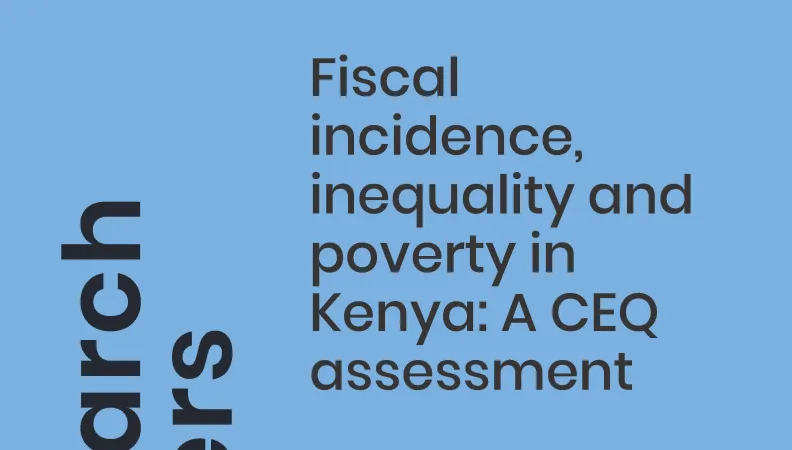Share the page
Fiscal incidence, inequality and poverty in Kenya: A CEQ assessment
Published on

The objective of this paper is to evaluate the effects of fiscal policy actions by the Government of Kenya on inequality and poverty. The paper uses the Kenya Integrated Household Budget Survey (KIHBS) dataset for 2015/16 combined with administrative data for the same period to construct various income concepts that are used in an analysis of welfare effects of fiscal measures following the methodology developed by the Commitment to Equity (CEQ) Institute (Lustig, 2018). The results show that the combined impact of government taxes and expenditure actions is to reduce inequality and increase poverty, a finding that is similar to effects reported in CEQ studies done in other African countries, such as Ghana, Tanzania, Uganda and Ethiopia. The study also finds that people in the first six deciles of the income distribution are net beneficiaries of taxation plus all social expenditures while those at the richer three deciles are net tax-payers, indicating that individually and jointly, taxation and social spending in Kenya are progressive. On a cash only basis (i.e. excluding in-kind health and education benefits), however, only the first decile is a net beneficiary, largely because indirect taxes are paid by everyone, including the poor. This is despite the fact that, contrary to expectation, indirect taxes in Kenya are generally progressive. However, direct taxes are significantly more progressive than the indirect taxes, i.e. they are paid at higher rates in richer deciles. Further, cash and near-cash transfers, basic education and health benefits are pro-poor while tertiary education benefits are not. Cash and near-cash transfers lead to a reduction in poverty. Finally, simulation results show that increasing cash transfer to existing beneficiaries by 50% and increasing coverage could lead to greater reduction in poverty and inequality. The main conclusion of our analysis is that Kenya’s fiscal policy can be redesigned to support both inequality and poverty reduction.
Useful Information
-
Authors
-
Damiano Kulundu MANDA, Reuben MUTEGI, Samuel KIPRUTO, Moses MURIITHI, Martine OLECHE, Germano MWABU, Stephen D. YOUNGER
-
Coordinators
-
Edition
-
195
-
Page number
-
54
-
ISSN
-
2492 - 2846
-
Collection
-
Research Papers
